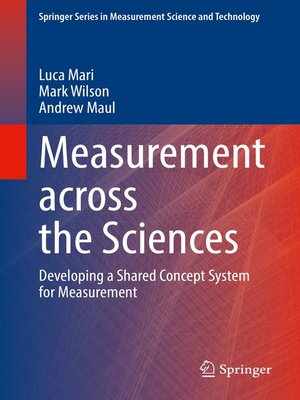Measurement across the Sciences
ebook ∣ Developing a Shared Concept System for Measurement · Springer Series in Measurement Science and Technology
By Luca Mari

Sign up to save your library
With an OverDrive account, you can save your favorite libraries for at-a-glance information about availability. Find out more about OverDrive accounts.
Find this title in Libby, the library reading app by OverDrive.



Search for a digital library with this title
Title found at these libraries:
| Library Name | Distance |
|---|---|
| Loading... |
This book proposes a conceptual framework for understanding measurement across a broad range of scientific fields and areas of application, such as physics, engineering, education, and psychology. The authors, who themselves span these disciplines, argue that the justification of the public trust attributed to measurement results can in principle apply identically to both physical and psychosocial properties. They further argue that the lack of a common conceptualization of measurement hampers interdisciplinary communication and limits the ability to share knowledge. They advance their views by first surveying the conceptual history of the philosophy of measurement and arguing that classical, operationalist and representational perspectives on measurement each make important contributions but also each have important shortcomings. A synthesis is then offered as the foundation for a new conceptual framework. The authors describe how the framework, which operates as a shared concept system, supports understanding measurement's work in different domains, using examples in the physical and human sciences. They consider connections and consequences with respect to causality, objectivity, and intersubjectivity, among other topics, and how measurement science concepts and issues are construed across these disciplines and settings. They also address contemporary issues and controversies within measurement in the light of the framework, including operationalism, definitional uncertainty, and the relations between measurement and computation. The book concludes with a justification for the basic claim that measurement is an empirical and informational process that produces explicitly justifiable information.
Researchers and academics across a wide range of disciplines including biological, physical, social and behavioral scientists, as well as specialists in measurement and philosophy will appreciate the work's fresh and provocative approach to the field at a time when sound measurements of complex scientific systems are increasingly essential to solving critical global problems.






